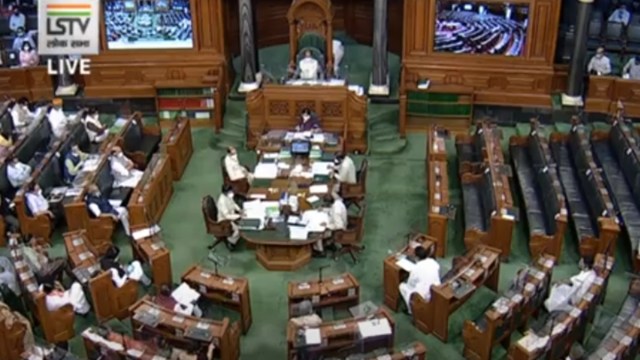- India
- International
A cautious step forward
Bilateral Netting of Qualified Financial Contracts Bill, 2020 could increase liquidity in the economy.
 As the house met, Congress MPs raised banners with “Don’t kill the Farmers” slogans and “Kisanon par Tanashahi nahin chalegi”. (ANI)
As the house met, Congress MPs raised banners with “Don’t kill the Farmers” slogans and “Kisanon par Tanashahi nahin chalegi”. (ANI)Written by Varun Varma
A regulation must be formed and enacted in a way that promotes innovation instead of killing it. Netting Agreement refers to an agreement between two parties which provides the net claim or liability after setting off or adjusting the claims arising out of the mutual transaction between the parties. The concept of Netting Agreements is widely recognised by the economically advanced countries in the world.
As remarked by Sujeet Kumar during the Lok Sabha session, a report by the RBI suggests that due to the lack of financial regulations and statutes in India, around Rs 2,000 crore is still locked up in financial markets. Minister Suresh Prabhu remarked in the Parliament that the financial derivatives sector is 20 times bigger than the global economy sector and the economic crisis of 2007-2008 hit through the banking sector due to an effect in derivatives market. Therefore, there was a dire need to introduce a regulation governing the financial markets in India.
The central government has introduced the Bilateral Netting of Qualified Financial Contracts Bill, 2020. This bill is based on the the Model Netting Act 2018 by the International Swaps and Derivatives Association (ISDA). This bill is applied on a qualified financial contract, that is, a netting agreement or between a qualified financial market participant and an authority as mentioned under the First Schedule of the bill. A qualified financial market participant includes a banking institution or a non-banking financial company which is regulated and supervised by the RBI; any foreign and Indian individual, partnership firm, company or any other person including any international or regional development bank or organisation; any insurance or reinsurance company regulated by IRDAI; a pension fund regulated by the Pension Fund Regulatory and Development Authority (PFRDA); a financial institution regulated by International Financial Services Centre Authority (IFSCA) and any other entity as notified by authority.
An authority under this bill is referred to as central government, RBI, SEBI, IRDAI, PFRDA and IFSCA. A qualified financial contract refers to any bilateral agreement, contract, transaction, regulated by the Authority but excludes any contract entered as per the Securities Contracts (Regulation) Act 1956 and Payment and Settlement Systems Act 2007.

For enforcing the netting of the qualified financial contract between the authority and a qualified financial market participant, a netting agreement must subsist between the parties but the inclusion of any non-qualified financial contract in a netting agreement does not make the enforceability of the qualified financial contract void. Significantly, the close out netting of a qualified financial contract is also enforceable against an insolvent party, guarantor or anyone providing collateral or security for a party and it shall not be affected or stopped by the appointment of an administration practitioner, any law applicable to administration and insolvent party. To commence the “close out netting process” between the parties in a qualified financial contract, a notice is to be invoked by one of the party on account of default or termination. Thereafter, the parties are obligated to provide a single net amount of damages and liability arising out of the qualified financial contract against the other party which will be set off and the realisation or appropriation of the remaining liability will take place without notice through the collateral provided by the parties or as per the collateral arrangement agreement entered between the parties.
Due to the absence of any financial regulation on netting agreements, banks and other financial and non-financial institutions had suffered a major setback. The bill not only brings a reduction in credit risk and capital burden on the banks and other financial institutions but it also increases liquidity in the Indian financial market, which further strengthens the opportunity for foreign direct investment in India. Significantly, the bill also reduces unnecessary litigation and waste of business resources.
This bill ensures the margin when the OTC trade is made between two business entities which provides more liquidity in market. It also opens the doors for Indian business entities for sovereign borrowing globally.
This bill fails to provide any significant impact on the capital of banks and other financial institution and it reduces counter-party credit risk. This bill can also be utilised for potential money laundering by tax avoidance. The significant drawback of this bill revolves around the freezing of the ongoing proceedings and even the imposition of moratorium proceedings on the defaulter.
In the end, the bill is a step forward. It may act as a step towards stabilising the Indian economy, which is badly affected due to the novel coronavirus.
The writer is a lawyer
EXPRESS OPINION
More Explained
Apr 26: Latest News
- 01
- 02
- 03
- 04
- 05











































